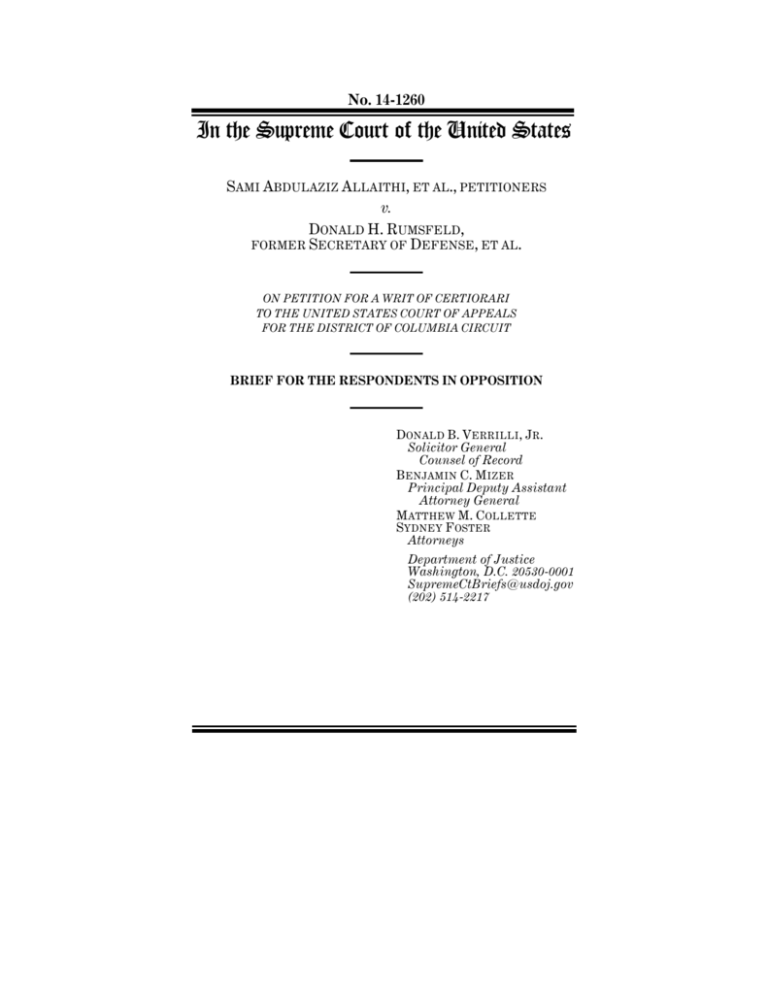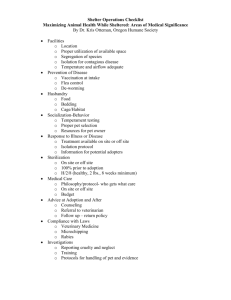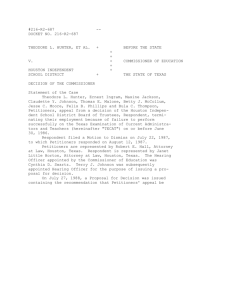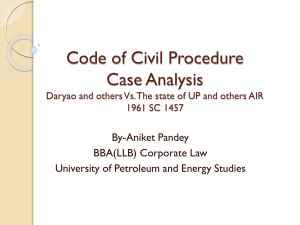14-1260 Allaithi US Opp (24 July 2015)
advertisement

No. 14-1260 In the Supreme Court of the United States SAMI ABDULAZIZ ALLAITHI, ET AL., PETITIONERS v. DONALD H. RUMSFELD, FORMER SECRETARY OF DEFENSE, ET AL. ON PETITION FOR A WRIT OF CERTIORARI TO THE UNITED STATES COURT OF APPEALS FOR THE DISTRICT OF COLUMBIA CIRCUIT BRIEF FOR THE RESPONDENTS IN OPPOSITION DONALD B. VERRILLI, JR. Solicitor General Counsel of Record BENJAMIN C. MIZER Principal Deputy Assistant Attorney General MATTHEW M. COLLETTE SYDNEY FOSTER Attorneys Department of Justice Washington, D.C. 20530-0001 SupremeCtBriefs@usdoj.gov (202) 514-2217 QUESTIONS PRESENTED 1. Whether, under respondeat superior principles of District of Columbia law, former federal officials acted within the scope of their employment when they supervised and managed the detention and treatment of aliens held at the U.S. military facility in Guantánamo Bay, Cuba, in the period after Combatant Status Review Tribunals determined that the aliens should no longer be classified as “enemy combatants.” 2. Whether aliens captured abroad during a time of armed conflict and held at Guantánamo Bay may obtain damages against federal officials under the Religious Freedom Restoration Act of 1993, 42 U.S.C. 2000bb et seq., for allegedly unlawful treatment between 2001 and 2006. (I) PARTIES TO THE PROCEEDING We adopt the description of the parties to the proceeding in the petition for a writ of certiorari, but we note that petitioners Zakirjan Hasam and Abu Muhammad are using pseudonyms in this litigation. See 1:06-CV-1996 Docket entry No. 15 (D.D.C. Apr. 9, 2007); 1:06-CV-1996 Docket entry No. 8 (D.D.C. Mar. 22, 2007). (II) TABLE OF CONTENTS Page Opinions below ................................................................................ 1 Jurisdiction ...................................................................................... 1 Statement ......................................................................................... 2 Argument ....................................................................................... 10 Conclusion ...................................................................................... 27 TABLE OF AUTHORITIES Cases: Ali v. Rumsfeld, 649 F.3d 762 (D.C. Cir. 2011) ............. 14, 18 Ashcroft v. al-Kidd, 131 S. Ct. 2074 (2011) .......................... 21 Ashcroft v. Iqbal, 556 U.S. 662 (2009) ................................... 17 Bame v. Dillard, 637 F.3d 380 (D.C. Cir. 2011) .................. 22 Boumediene v. Bush, 553 U.S. 723 (2008)............................ 21 Bowen v. Massachusetts, 487 U.S. 879 (1988) ..................... 19 Boykin v. District of Columbia, 484 A.2d 560 (D.C. 1984) ............................................................................... 16 Burwell v. Hobby Lobby Stores, Inc., 134 S. Ct. 2751 (2014) .......................................................................... 10, 24, 25 City of Boerne v. Flores, 521 U.S. 507 (1997) ...................... 22 Companhia Brasileira Carbureto de Calico v. Applied Indus. Materials Corp., 640 F.3d 369 (D.C. Cir. 2011), answered certified question, 35 A.2d 1127 (D.C. 2012) ...................................................... 19 Council on Am. Islamic Relations v. Ballenger, 444 F.3d 659 (D.C. Cir. 2006) ............................ 12, 13, 15, 17 Cuban Am. Bar Ass’n v. Christopher, 43 F.3d 1412 (11th Cir.), cert. denied, 515 U.S. 1142, and 516 U.S. 913 (1995) ...................................................................... 22 District of Columbia v. Coron, 515 A.2d 435 (D.C. 1986) ............................................................................. 13 EEOC v. Arabian Am. Oil Co., 499 U.S. 244 (1991) ........... 23 (III) IV Cases—Continued: Page Elk Grove Unified Sch. Dist. v. Newdow, 542 U.S. 1 (2004) ...................................................................................... 19 Foley Bros., Inc. v. Filardo, 336 U.S. 281 (1949) ................ 23 Grimes v. B.F. Saul Co., 47 F.2d 409 (D.C. 1931) ............... 16 Haddon v. United States, 68 F.3d 1420 (D.C. Cir. 1995), overruled on other grounds, Osborn v. Haley, 549 U.S. 225 (2007) ............................................ 13, 15 Harbury v. Hayden, 522 F.3d 413 (D.C. Cir.), cert. denied, 555 U.S. 881 (2008)......................................... 18 Harlow v. Fitzgerald, 457 U.S. 800 (1982) ........................... 21 Johnson v. Eisentrager, 339 U.S. 763 (1950) ....................... 22 Jordan v. Medley, 711 F.2d 211 (1983) ........................... 17, 18 Kiobel v. Royal Dutch Petroleum Co., 133 S. Ct. 1659 (2013) ...................................................................................... 23 Kimbro v. Velten, 30 F.3d 1501 (D.C. Cir. 1994), cert. denied, 515 U.S. 1145 (1995)....................................... 11 Lamont v. Woods, 948 F.2d 825 (2d Cir. 1991) .............. 25, 26 Lebron v. Rumsfeld, 670 F.3d 540 (4th Cir.), cert. denied, 132 S. Ct. 2751 (2012) .................................... 23 Lyon v. Carey, 533 F.2d 649 (D.C. Cir. 1976) ...................... 16 Padilla v. Yoo, 678 F.3d 748 (9th Cir. 2012) ........................ 23 Pelletier v. Federal Home Loan Bank, 968 F.2d 865 (9th Cir. 1992) ........................................................................ 12 Penn Cent. Transp. Co. v. Reddick, 398 A.2d 27 (D.C. 1979) ................................................................. 13, 14, 16 Ramey v. Bowsher, 915 F.2d 731 (D.C. Cir. 1990), cert. denied, 499 U.S. 947 (1991)......................................... 15 Rasul v. Myers: 512 F.3d 644 (D.C. Cir.), vacated and remanded, 555 U.S. 1083 (2008), reinstated in relevant part, 563 F.3d 527 (D.C. Cir.), cert. denied, 558 U.S. 1091 (2009) ........................................... passim V Cases—Continued: Page 563 F.3d 527 (D.C. Cir.), cert. denied, 558 U.S. 1091 (2009) ............................................6, 7, 9, 20, 24, 25 558 U.S. 1091 (2009) .................................................... 11, 26 United States v. Smith, 499 U.S. 160 (1991) ........................ 11 United States v. Verdugo-Urquidez, 494 U.S. 259 (1990) ...................................................................................... 22 United States ex rel. Turner v. Williams, 194 U.S. 279 (1904) ............................................................................... 22 Weinberg v. Johnson, 518 A.2d 985 (D.C. 1986) ..................................................................... 12, 13, 16, 17 Wilson v. Layne, 526 U.S. 603 (1999) ............................. 21, 22 Wilson v. Libby, 535 F.3d 697 (D.C. Cir. 2008), cert. denied, 557 U.S. 919 (2009)................................... 15, 18 Wisniewski v. United States, 353 U.S. 901 (1957) .............. 18 Constitution and statutes: U.S. Const.: Amend. I ....................................................................... 22, 25 Establishment Clause ................................................. 26 Amend. IV .................................................................... 22, 26 Amend. V ............................................................................ 22 Alien Tort Statute, 28 U.S.C. 1350 .......................................... 3 Authorization for Use of Military Force, Pub. L. No. 107-40, 115 Stat. 224: § 2a, 115 Stat. 224 ................................................................ 2 Dictionary Act, 1 U.S.C. 1 ................................................ 24, 25 Federal Employees Liability Reform and Tort Compensation Act of 1988, Pub. L. No. 100-694, 102 Stat. 4563 .......................................................................... 5 28 U.S.C. 2679(b)(1) ...................................................... 5, 11 28 U.S.C. 2679(d)(1) ............................................................ 5 VI Statutes—Continued: Page Federal Tort Claims Act, 28 U.S.C. 1346(b), 2671 et seq.: 28 U.S.C. 1346(b) ................................................................. 5 28 U.S.C. 2672 ...................................................................... 5 28 U.S.C. 2675(a) ........................................................... 6, 19 Religious Freedom Restoration Act of 1993, 42 U.S.C. 2000bb et seq. ........................................................ 3 42 U.S.C. 2000bb-1 .............................................................. 6 42 U.S.C. 1985 .................................................................. 11 Miscellaneous: Restatement (Second) of Agency (1958) .............. 7, 12, 17 In the Supreme Court of the United States No. 14-1260 SAMI ABDULAZIZ ALLAITHI, ET AL., PETITIONERS v. DONALD H. RUMSFELD, FORMER SECRETARY OF DEFENSE, ET AL. ON PETITION FOR A WRIT OF CERTIORARI TO THE UNITED STATES COURT OF APPEALS FOR THE DISTRICT OF COLUMBIA CIRCUIT BRIEF FOR THE RESPONDENTS IN OPPOSITION OPINIONS BELOW The opinion of the court of appeals (Pet. App. 1a16a) is reported at 753 F.3d 1327. The opinion of the district court (Pet. App. 17a-31a) is reported at 920 F. Supp. 2d 53. JURISDICTION The judgment of the court of appeals was entered on June 10, 2014. A petition for rehearing was denied on November 18, 2014 (Pet. App. 32a-33a). On January 14, 2015, the Chief Justice extended the time within which to file a petition for a writ of certiorari to and including April 17, 2015, and the petition was filed on that date. The jurisdiction of this Court is invoked under 28 U.S.C. 1254(1). (1) 2 STATEMENT 1. Petitioners are foreign nationals who were taken into U.S. military custody shortly after the attacks of September 11, 2001, pursuant to the Authorization for Use of Military Force (AUMF), Pub. L. No. 107-40, § 2(a), 115 Stat. 224. Pet. App. 18a-19a. Each petitioner was initially detained in Afghanistan and was then transferred to the U.S. military detention facility at Guantánamo Bay, Cuba. Id. at 19a; see id. at 2a. Three of the six petitioners were transferred to their home country, Turkey, between November 2003 and April 2004. C.A. App. 29-30; see Pet. App. 2a. In July 2004, the Department of Defense established “Combatant Status Review Tribunals” (CSRTs) to review whether Guantánamo detainees held at that time were properly detained as “enemy combatants.” Pet. App. 8a-9a; see Memorandum from the Deputy Sec’y of Def. to the Sec’y of the Navy 3 (July 7, 2004) (July 7 Memo); 1 Memorandum from the Sec’y of the Navy for Distribution 1 (July 29, 2004) (July 29 Memo). 2 CSRT decisions were subject to review by a Department of Defense “Convening Authority.” See July 7 Memo 3; July 29 Memo 2, encl. 1, at 9. If a CSRT determined that a “detainee [should] no longer be classified as an enemy combatant,” and if that determination was approved by the Convening Authority, the Secretary of State was to be informed in order “to permit [him or her] to coordinate the transfer of the detainee with representatives of the detainee’s country of nationality for release or other disposition consistent with applicable laws.” July 29 Memo 1 2 http://www.defenselink.mil/news/Jul2004/d20040707review.pdf. http://www.defenselink.mil/news/Jul2004/d20040730comb.pdf. 3 encl. 1, at 9; see July 7 Memo, at 3-4; see also Pet. App. 8a-9a. In late 2004, CSRTs concluded that the three petitioners still in custody at that time at Guantánamo Bay—Sami Abdulaziz Allaithi, Zakirjan Hasam, and Abu Muhammad—should no longer be classified as enemy combatants, Pet. App. 2a, 48a, 73a, 80a, although the record does not establish when the Convening Authority reviewed and finalized those determinations. Allaithi was transferred to his home country, Egypt, in October 2005. Id. at 44a; see id. at 3a. Hasam and Muhammad were transferred to Albania in November 2006. Id. at 58a, 75a; see C.A. App. 42, 76; see also Pet. App. 2a-3a, 20a. 2. a. After petitioners were transferred out of U.S. custody, they filed suits in the United States District Court for the District of Columbia against former Secretary of Defense Donald Rumsfeld, numerous other named high-ranking Department of Defense officials, and 100 unnamed “John Does,” all of whom were sued in their individual capacities. C.A. App. 3137, 100-105; see Pet. App. 3a-4a, 20a, 40a-43a. The two complaints contended that petitioners had been detained without reasonable cause, mistreated during their detention by unnamed individuals, and denied the ability to freely practice their religion. C.A. App. 26-82, 97-119. As relevant here, petitioners alleged violations of international law (assertedly actionable under the Alien Tort Statute, 28 U.S.C. 1350), and the Religious Freedom Restoration Act of 1993 (RFRA), 42 U.S.C. 2000bb et seq. Pet. App. 25a & n.2; see id. at 3a, 21a. They sought damages and declaratory relief, 4 id. at 51a, 85a, although they later abandoned their requests for declaratory relief. 3 Only two paragraphs of the complaints specified conduct allegedly taken by any of the individual respondents, 4 and those allegations related to only three of the respondents—Secretary Rumsfeld, Major General (Retired) Michael Dunlavey, and Major General (Retired) Geoffrey Miller. Pet. App. 49a-50a ¶¶ 8182; id. at 83a-84a ¶¶ 182-183. 5 Petitioners alleged that in October 2002, “Defendant Dunlavey requested permission of Defendant Rumsfeld to make interrogations in Guantanamo more aggressive” and that “Defendant Miller * * * also pushed for the use of more aggressive techniques.” Id. at 49a, 83a. They further alleged that “Defendant Rumsfeld thereafter approved numerous interrogation methods” that were “clearly illegal,” signing a “then-classified memorandum approving” certain techniques in December 2002 but “rescind[ing] the blanket approval of these methods” in January 2003. Id. at 49a, 83a-84a. In addition, petitioners alleged that in April 2003 or later, Secretary Rumsfeld “issued a new set of recommended 3 See Allaithi Mem. of Points & Auths. in Opp. to Mot. to Dismiss, 1:08-CV-1677 Docket entry No. 14, at 35 n.24 (Apr. 19, 2010); Celikgogus et al. Mem. of Points & Auths. in Opp. to Mot. to Dismiss, 1:06-CV-1996 Docket entry No. 45, at 40 n.28 (Apr. 19, 2010). 4 This brief uses the term “individual respondents” to refer only to those individual respondents who were named, i.e., not the John Doe defendants. 5 General Dunlavey was sued based on his role as the former Commander of Joint Task Force-170 and the former Commander of Joint Task Force-Guantanamo, and General Miller was sued based on his role as the former Commander of Joint Task ForceGuantanamo. See, e.g., Pet. App. 61a. 5 techniques, requiring his explicit approval for four techniques that violated the Geneva Conventions and/or customary international law.” Id. at 49a-50a, 84a. b. The Federal Employees Liability Reform and Tort Compensation Act of 1988 (Westfall Act), Pub. L. No. 100-694, 102 Stat. 4563, provides, with exceptions not relevant here, that “[t]he remedy against the United States provided by [the Federal Tort Claims Act (FTCA), 28 U.S.C. 1346(b), 2672] for injury or loss of property, or personal injury or death arising or resulting from the negligent or wrongful act or omission of any employee of the Government while acting within the scope of his office or employment is exclusive of any other civil action or proceeding for money damages by reason of the same subject matter against the employee whose act or omission gave rise to the claim.” 28 U.S.C. 2679(b)(1). The Westfall Act further provides that when suit is brought against an employee of the federal government, and the Attorney General certifies that “the defendant employee was acting within the scope of his office or employment at the time of the incident out of which the claim arose, any civil action or proceeding commenced upon such claim in a United States district court shall be deemed an action against the United States * * * and the United States shall be substituted as the party defendant.” 28 U.S.C. 2679(d)(1). In each of these cases, the Attorney General (through his designee) certified that, “at the time of the conduct alleged in the complaint,” the individual respondents “were acting within the scope of their employment as employees of the United States.” C.A. App. 132-133. Accordingly, the United States substi- 6 tuted itself as the sole defendant on the internationallaw claims. See Pet. App. 4a. c. The district court consolidated petitioners’ two actions for all pretrial purposes, C.A. App. 134-135, and then dismissed both complaints, Pet. App. 17a31a. As relevant here, the district court, applying D.C. law respondeat superior principles, held that the individual respondents’ alleged conduct fell within the scope of their employment and thus that the United States had properly substituted itself as the sole defendant under the Westfall Act on the internationallaw claims. Id. at 21a-28a. The court further held that those claims could not proceed against the United States because petitioners had not exhausted administrative remedies, as required by the FTCA. Id. at 28a; see 28 U.S.C. 2675(a). The district court also dismissed petitioners’ RFRA claims. Pet. App. 30a. RFRA provides that “Government shall not substantially burden a person’s exercise of religion even if the burden results from a rule of general applicability,” unless “it demonstrates that application of the burden to the person * * * is in furtherance of a compelling governmental interest; and * * * is the least restrictive means of furthering that compelling governmental interest.” 42 U.S.C. 2000bb-1. The district court held that petitioners’ claims were foreclosed by the D.C. Circuit’s 2008 and 2009 decisions in Rasul v. Myers. Pet. App. 30a; see Rasul v. Myers, 512 F.3d 644 (D.C. Cir.) (Rasul I), vacated and remanded, 555 U.S. 1083 (2008), reinstated in relevant part, Rasul v. Myers, 563 F.3d 527 (per curiam) (Rasul II), cert. denied, 558 U.S. 1091 (2009). In Rasul I and Rasul II, former Guantánamo detainees alleged RFRA violations by Secretary Rumsfeld 7 and military officials between 2002 and 2004. Rasul II, 563 F.3d at 528; Rasul I, 512 F.3d at 649 & n.1, 651. Rasul II held that, as non-resident aliens, detainees at Guantánamo Bay are not among the “person[s]” covered by RFRA and that, “[i]n the alternative,” the defendants would be entitled to qualified immunity from damages claims. 563 F.3d at 532-533 & n.6 (relying on Rasul I, 512 F.3d at 676 & n.5 (Brown, J., concurring)); see Rasul I, 512 F.3d at 667672 (majority opinion). Applying that holding, the district court in this case concluded that “[b]ecause [petitioners] were non-resident aliens at the time of the alleged RFRA violations, their RFRA claims must also be dismissed for failure to state a claim.” Pet. App. 30a. 3. The court of appeals consolidated petitioners’ appeals and affirmed. Pet. App. 1a-16a. a. With respect to the international-law claims, the court of appeals agreed with the district court that, under D.C. law, the individual respondents had acted within the scope of their employment during the incidents alleged in petitioners’ complaints, and therefore held that the district court had correctly dismissed the international-law claims after substituting the United States. See Pet. App. 5a-14a. The court of appeals determined that each of the factors necessary for respondeat superior liability under D.C. law— including, as relevant here, that the allegedly tortious activity was “of the kind [the defendant] is employed to perform” and was “actuated, at least in part, by a purpose to serve the master”—were satisfied by the conduct alleged in petitioners’ complaints. Id. at 6a (quoting Restatement (Second) of Agency § 228(1) (1958)); see id. at 6a-7a. 8 The court of appeals first explained that its prior decision in Rasul I, which addressed similar international-law claims brought by Guantánamo detainees who had never received a CSRT determination, compelled the conclusion that any acts that the individual respondents committed against the three petitioners who had never received a CSRT determination were within the scope of respondents’ employment. Pet. App. 7a; see Rasul I, 512 F.3d at 654-662. The court added that, “by [petitioners’] own admission, this case does not focus on” those petitioners, because under petitioners’ legal theory, a favorable CSRT determination was “a dispositive factor” for finding that respondents acted outside the scope of their employment. Pet. App. 7a & n.2. The court of appeals then reached the same conclusion for the three petitioners who had received CSRT determinations that they were no longer classified as enemy combatants. See Pet. App. 8a-14a. The court rejected petitioners’ contention that their continued detention after their CSRT decisions was beyond the scope of the respondents’ employment because the AUMF assertedly “only permitted the lawful detention of suspected enemy combatants.” Id. at 8a. The court explained that “[o]bviously, * * * the individual [respondents] here were expected to facilitate continued detention post-CSRT clearance” until petitioners’ transfer out of U.S. custody could be arranged. Ibid. (citing July 7 Memo 3-4). “Nothing indicates,” the court continued, that “a failure to effectuate an immediate release of detention was a dereliction of duty putting [respondents’] conduct outside the scope of employment.” Id. at 9a. 9 The court of appeals also rejected petitioners’ argument that the post-CSRT mistreatment alleged by two of the three petitioners (Hasam and Muhammad) rendered the individual respondents’ conduct following petitioners’ CSRT determinations beyond the scope of their employment. Pet. App. 9a-14a. 6 Following its analysis in Rasul I, the court held that the alleged post-CSRT mistreatment was incidental to petitioners’ detention in a high-security military facility, observing that “the need to maintain an orderly detention environment remained after CSRT clearance.” Id. at 11a. The court also emphasized that petitioners’ complaints did not allege that the individual respondents’ actions were “completely devoid of a purpose to serve the United States.” Id. at 12a-13a. Indeed, the court observed, the complaints did not even “specify how the named [respondents] were involved with [alleged] abuses” postdating petitioners’ CSRT determinations. Id. at 14a (emphasis omitted). b. The court of appeals held that petitioners’ RFRA claims were “foreclosed by the [D.C. Circuit’s] Rasul decisions.” Pet. App. 14a; see Rasul II, 563 F.3d at 532-533 & n.6; Rasul I, 512 F.3d at 667-672. The court explained that “because [petitioners] were located outside sovereign United States territory at the time their alleged RFRA claim arose, they do not fall [within RFRA’s] definition of ‘person’ and are therefore barred from bringing a RFRA challenge.” 6 The court of appeals noted that petitioner Allaithi did “not allege he was subjected to treatment similar to that endured by Hasam and Muhammad after his CSRT clearance.” Pet. App. 11a n.4. Instead, he alleged only that he was “ held for ten additional months after his CSRT before his transfer out of Guantanamo.” Ibid. (quoting C.A. App. 114). 10 Pet. App. 14a-15a (second set of brackets in original) (quoting Rasul I, 512 F.3d at 672) (internal quotation marks omitted). 4. Petitioners filed a petition for rehearing en banc, arguing that this Court’s intervening precedent in Burwell v. Hobby Lobby Stores, Inc., 134 S. Ct. 2751 (2014), undermined the court of appeals’ interpretation of RFRA. Pet. for Reh’g 1-8. The court of appeals denied rehearing after no judge called for a vote. Pet. App. 32a-33a. ARGUMENT Petitioners contend (Pet. 13-26) that the court of appeals misapplied respondent superior principles of District of Columbia law in holding that the United States should be substituted for respondents under the Westfall Act on petitioners’ international-law claims. That contention lacks merit, and petitioners do not argue that the court of appeals’ interpretation and application of D.C. law conflicts with a decision of this Court, another federal court of appeals, or the District of Columbia Court of Appeals. Petitioners also briefly argue (Pet. 31-35) that the court of appeals erred in holding that RFRA does not apply to claims by aliens held at the military facility at Guantánamo Bay. But the decision below correctly construed RFRA, and in any event petitioners do not challenge the D.C. Circuit’s conclusion that even if RFRA applies to aliens held at the military facility at Guantánamo Bay, federal officials would be entitled to qualified immunity from damages claims. Given the novelty of the question whether RFRA applies to aliens held by the military at Guantánamo Bay and the fact that the only courts of appeals that have addressed that question have held or suggested that 11 RFRA does not apply to such detainees, the court of appeals’ qualified-immunity holding is clearly correct. And this Court has previously denied a certiorari petition challenging the D.C. Circuit’s construction of RFRA. See Rasul v. Myers, 558 U.S. 1091 (2009). Accordingly, further review is unwarranted. 7 1. The court of appeals held that, under D.C. law, the individual respondents were acting within the scope of their employment at the time of the events alleged in petitioners’ complaints and thus that the United States had properly substituted itself under the Westfall Act as the sole defendant on petitioners’ international-law claims. Pet. App. 5a-14a. That conclusion was correct and, in any event, does not present a question of federal law that would warrant this Court’s review. a. Under the Westfall Act, 28 U.S.C. 2679(b)(1), claims against federal employees for allegedly tortious acts done within the scope of their employment must generally proceed exclusively against the United States under the FTCA. United States v. Smith, 499 U.S. 160, 163 (1991); see p. 5, supra. When, as here, the Attorney General (or his or her designee) certifies that an employee was acting within the scope of his or her employment, the burden falls on the plaintiff to rebut that determination. Kimbro v. Velten, 30 F.3d 7 Petitioners do not renew their arguments that the district court erred in dismissing their claims asserting violations of the Constitution and 42 U.S.C. 1985. In addition, as in the court of appeals, petitioners do not challenge the district court’s dismissal of their claims asserted against the “John Doe” defendants, and they do not dispute the court of appeals’ conclusion that “[a]ny issues concerning these defendants are * * * forfeited,” Pet. App. 4a n.1. Petitioners have thus forfeited all such challenges. 12 1501, 1509 (D.C. Cir. 1994), cert. denied, 515 U.S. 1145 (1995); see Council on Am. Islamic Relations v. Ballenger, 444 F.3d 659, 662 (D.C. Cir. 2006) (per curiam). As petitioners acknowledge (Pet. 14), “[w]hether a defendant acted within the scope of his or her employment is * * * a question of state respondeat superior law.” See Pet. App. 5a; see also, e.g., Ballenger, 444 F.3d at 663; Pelletier v. Federal Home Loan Bank, 968 F.2d 865, 875-876 (9th Cir. 1992). The parties agree that D.C. law governs the issue here. See Pet. 16. D.C. law incorporates the Restatement (Second) of Agency (1958) (Restatement). Pet. App. 5a-6a; see Ballenger, 444 F.3d at 663. Under the Restatement, four requirements must be met to establish that an employee’s allegedly tortious conduct falls within the scope of his employment: (a) it is of the kind he is employed to perform; (b) it occurs substantially within the authorized time and space limits; (c) it is actuated, at least in part, by a purpose to serve the master; and (d) if force is intentionally used by the servant against another, the use of force is not unexpectable by the master. Pet. App. 6a (quoting Restatement § 228(1)). That test “is an objective one, based on all the facts and circumstances.” Ballenger, 444 F.3d at 663 (quoting Weinberg v. Johnson, 518 A.2d 985, 991 (D.C. 1986)). Petitioners contend (Pet. 16-24) that, with respect to the detention and treatment of petitioners Allaithi, Hasam, and Muhammad after CSRTs determined that they should no longer be classified as enemy combatants, the first and third requirements of the Restate- 13 ment test are not met. The court of appeals correctly rejected petitioners’ arguments as inconsistent with D.C. law. 8 i. As petitioners acknowledge (Pet. 16-17), the first scope-of-employment requirement—that the alleged conduct “is of the kind [the employee] is employed to perform”—is satisfied if the alleged conduct is “of the same general nature as that authorized or [is] incidental to the conduct authorized.” Ballenger, 444 F.3d at 664 (citations and internal quotation marks omitted; emphasis altered). Under D.C. law, “conduct is ‘incidental’ to an employee’s legitimate duties if it is ‘foreseeable,’ ” which “in this context does not carry the same meaning as it does in negligence cases,” but rather “requires the court to determine whether it is fair to charge employers with responsibility for the intentional torts of their employees.” Haddon v. United States, 68 F.3d 1420, 1424 (D.C. Cir. 1995) (citing Weinberg, 518 A.2d at 990; District of Columbia v. Coron, 515 A.2d 435, 438 (D.C. 1986); and Penn Cent. Transp. Co. v. Reddick, 398 A.2d 27, 29-30 (D.C. 1979)), overruled on other grounds, Osborn v. Haley, 549 U.S. 225 (2007). That standard “is broad enough to embrace any intentional tort arising out of a dispute that was originally undertaken on the employer’s behalf.” Rasul v. Myers, 512 F.3d 644, 657 (D.C. Cir.) (Rasul I) (citation omitted), 8 Petitioners do not now dispute that the individual respondents were acting within the scope of their employment with respect to (i) all claims asserted by the three petitioners who were transferred from Guantánamo prior to the establishment of CSRTs (see p. 8, supra); and (ii) the claims asserted by the remaining three petitioners concerning events that took place before their CSRT determinations. 14 vacated and remanded, 555 U.S. 1083 (2008), reinstated in relevant part, Rasul v. Myers, 563 F.3d 527 (D.C. Cir.) (per curiam) (Rasul II), cert. denied, 558 U.S. 1091 (2009). But it excludes conduct that is “unrelated to the employee’s instructions or job assignment.” Id. at 658 (citing Penn Cent. Transp. Co., 398 A.2d at 32). The court of appeals correctly applied those settled principles of D.C. law to petitioners’ factual allegations. First, the post-CSRT detention of petitioners was the kind of work that the individual respondents were employed to perform. As the court of appeals explained, the Department of Defense memoranda establishing CSRTs (see p. 2, supra) made clear that detainees would continue to be held after a favorable CSRT determination until plans for their transfer could be made and implemented. See Pet. App. 8a-9a; July 29 Memo encl. 1, at 9; July 7 Memo 3-4. Accordingly, detaining petitioners after their CSRTs, until they could be transferred to an appropriate country, was well within the scope of respondents’ employment. See Pet. App. 9a. Second, the individual respondents’ conduct in managing and supervising petitioners’ post-CSRT treatment was also “of the kind” they were employed to perform. The court of appeals correctly concluded that, as in its prior decisions addressing similar international-law claims alleging mistreatment of military detainees held at Guantánamo Bay and elsewhere, the alleged conduct was foreseeable and incidental to the individual respondents’ duty to manage petitioners’ detention. Pet. App. 11a-12a; see Rasul I, 512 F.3d at 656-659; see also Ali v. Rumsfeld, 649 F.3d 762, 774-775 (D.C. Cir. 2011). Although the court of 15 appeals concluded that petitioners’ treatment after their favorable CSRT determinations could not have been undertaken in furtherance of intelligence gathering, it correctly held that the alleged treatment grew out of “the need to maintain an orderly detention environment.” Pet. App. 11a; see id. at 12a (alleged post-CSRT mistreatment “certainly foreseeable”). Petitioners nevertheless contend (Pet. 16-19) that the first scope-of-employment requirement is not met because petitioners’ post-CSRT detention and treatment assertedly were not authorized by the AUMF and were otherwise unlawful. But petitioners’ evident assumption—that unlawful conduct necessarily falls outside the scope of employment—“ ‘rests on a misunderstanding of D.C. scope-of-employment law (not to mention the plain text of the Westfall Act), which directs courts to look beyond alleged intentional torts themselves’ to the underlying conduct.” Wilson v. Libby, 535 F.3d 697, 711 (D.C. Cir. 2008) (quoting Ballenger, 444 F.3d at 664), cert. denied, 557 U.S. 919 (2009). As the D.C. Circuit has explained, “if the scope of an official’s authority or line of duty were viewed as coextensive with the official’s lawful conduct, then immunity would be available only where it is not needed; in effect, the immunity doctrine would be completely abrogate[d].” Ramey v. Bowsher, 915 F.2d 731, 734 (1990) (per curiam) (citations and internal quotation marks omitted; brackets in original) (making this observation in a related context), cert. denied, 499 U.S. 947 (1991). The question is not whether the alleged conduct was unlawful, but whether it is “fair to charge employers with responsibility for the intentional torts of their employees,” Haddon, 68 F.3d at 1424. Under that standard, courts applying 16 D.C. law have concluded that instances of serious misconduct were nevertheless incidental to an employee’s duties. See, e.g., Lyon v. Carey, 533 F.2d 649, 652-655 (D.C. Cir. 1976) (holding that mattress deliveryman acted within the scope of employment when assaulting and raping a customer during a deliveryrelated dispute); Weinberg, 518 A.2d at 988-989 (holding that laundromat employee acted within the scope of employment when shooting a customer in a dispute over missing shirts). Contrary to petitioners’ view (Pet. 17-18), this is not a case in which “the employee’s job merely provide[d] an opportunity to commit the [alleged] tort.” Pet. 17. The allegedly tortious conduct here was not “ ‘utterly without relation to the service which [the individual respondents were] employed to render,’ ” and their positions did not merely provide them the “opportunity to pursue [their] personal adventure.” Boykin v. District of Columbia, 484 A.2d 560, 563-564 (D.C. 1984) (emphasis omitted) (quoting Grimes v. B.F. Saul Co., 47 F.2d 409, 410 (D.C. 1931)). Rather, as the court of appeals explained, “the actions leading to [petitioners’ alleged] treatment were * * * ‘a direct outgrowth of the [respondents’] instructions or job assignment.’ ” Pet. App. 12a (quoting Penn Cent. Transp. Co., 398 A.2d at 32). For that reason, the first D.C. law respondeat superior requirement is readily met. ii. The court of appeals also correctly held that the third requirement of the D.C. law scope-ofemployment test—that the conduct was “actuated, at least in part, by a purpose to serve the master”—is satisfied here. See Pet. App. 12a-14a. As petitioners concede (Pet. 21), a mere “partial desire to serve the 17 master is sufficient to satisfy this element.” See Ballenger, 444 F.3d at 664-665. Furthermore, under D.C. law, “where the employee is in the course of performing job duties, the employee is presumed to be intending, at least in part, to further the employer’s interests.” Weinberg, 518 A.2d at 989; see Restatement § 235 cmt. a. Here, petitioners’ complaints do not allege with specificity that the individual respondents’ post-CSRT conduct was motivated by any personal purpose at all, much less an exclusively personal purpose. See Pet. App. 13a; see also Ashcroft v. Iqbal, 556 U.S. 662, 679 (2009) (“[O]nly a complaint that states a plausible claim for relief survives a motion to dismiss.”). Nowhere do the complaints adequately allege, for example, that the individual respondents were motivated by “personal animus” (Pet. 22). Moreover, even if petitioners had included specific allegations about respondents’ motivations, any allegation that respondents were not motivated, even in part, by a desire to serve their employer would be implausible. As the court of appeals explained, it is “difficult for a detainee to plausibly allege [that the individual respondents’] post-clearance conduct was entirely motivated by some sort of personal animus,” given that “the conduct is similar * * * to the sort” that is “within the scope of employment prior to clearance.” Pet. App. 13a (emphases omitted). Petitioners appear to contend (Pet. 21-23) that the D.C. Circuit’s decision in Jordan v. Medley, 711 F.2d 211 (1983) (Scalia, J.), supports the view that the intent requirement of the D.C. law scope-of-employment test can be satisfied merely by alleging outrageous acts, without any specific and plausible allegations of 18 an exclusively personal motivation. As an initial matter, any tension between D.C. Circuit decisions— particularly decisions on the meaning of D.C. law— could be resolved by that circuit. See Wisniewski v. United States, 353 U.S. 901, 902 (1957) (per curiam). But in any event, petitioners’ argument rests on a misreading of Jordan. Although Jordan observed that “a bank teller who shoots a bank examiner with the intent of serving his employer’s interest does not impose liability upon his principal,” the court’s point was that other elements of the scope-of-employment test—not the third, intent element—would not be satisfied in that situation. 711 F.2d at 214. That discussion therefore does not support petitioners’ argument that the third element is absent here. And while Jordan noted that in certain extreme circumstances “the very nature of the alleged tort * * * at least permits the imputation of purely personal motivation,” id. at 216, for the reasons set out above, such an inference is not plausible here. Indeed, as the court of appeals explained,“[d]espite vividly detailing the various abuses allegedly endured by the [petitioners]” after their CSRTs, “the complaints do not specify how the named [respondents] were involved with these abuses.” Pet. App. 14a. 9 9 Petitioners are also mistaken in arguing (Pet. 26) that the court of appeals erred when it resolved the scope-of-employment issue as a matter of law without ordering an evidentiary hearing. Contrary to petitioners’ suggestion (Pet. 26), the D.C. Circuit routinely decides that employees were acting within the scope of their employment based solely on the pleadings, just as in other cases in which a complaint fails to plausibly allege facts that could give rise to liability. See, e.g., Ali, 649 F.3d at 774-775; Wilson, 535 F.3d at 711-712; Harbury v. Hayden, 522 F.3d 413, 421-423, cert. denied, 555 U.S. 881 (2008); Rasul I, 512 F.3d at 659-660. 19 iii. The court of appeals accordingly was correct to hold that respondents’ alleged actions fell within the scope of their employment under D.C. respondeat superior principles. And for that reason, the United States was properly substituted as a defendant with respect to petitioners’ international-law claims, and the district court correctly dismissed those claims under the FTCA’s administrative-exhaustion requirement, 28 U.S.C. 2675(a). b. Petitioners do not contend that the court of appeals’ scope-of-employment holding conflicts with a decision of this Court or another court of appeals. As petitioners acknowledge (Pet. 14), moreover, the issue on which they seek review concerns “a question of state respondeat superior law.” This Court’s “custom on questions of state [or local] law ordinarily is to defer to the interpretation of the Court of Appeals for the Circuit in which the State is located.” Elk Grove Unified Sch. Dist. v. Newdow, 542 U.S. 1, 16 (2004); see Bowen v. Massachusetts, 487 U.S. 879, 908 (1988) (“We have a settled and firm policy of deferring to regional courts of appeals in matters that involve the construction of state law.”). And even if petitioners were correct (Pet. 20) that D.C. respondeat superior doctrine is an “area of the law * * * in need of clarity,” the D.C. Court of Appeals would be the proper court to clarify the pertinent legal principles. See Companhia Brasileira Carbureto de Calico v. Applied Indus. Materials Corp., 640 F.3d 369, 371 (D.C. Cir. 2011) (“The D.C. Court of Appeals is of course the controlling authority for interpretation of D.C. law.”), answered certified question, 35 A.3d 1127 (D.C. 2012). Accordingly, the first question presented does not warrant this Court’s review. 20 2. Petitioners briefly contend (Pet. 31-35) that the court of appeals erred in affirming the dismissal of their RFRA claims. See Pet. App. 14a-15a. That argument lacks merit, and petitioners do not argue at this stage that the D.C. Circuit erred in concluding that qualified immunity shields federal officials from RFRA damages claims brought by former Guantánamo detainees. a. As explained above (see pp. 6-7, supra), the D.C. Circuit held in Rasul II, 563 F.3d 527 (per curiam), cert. denied, 558 U.S. 1091 (2009), both that aliens held at the military detention facility at Guantánamo Bay are not “person[s]” within the coverage of RFRA, see id. at 532-533, and, “[i]n the alternative,” that qualified immunity protected federal officials from damages liability, id. at 533 n.6. In this case, respondents relied on both grounds to support affirming the district court’s dismissal of petitioners’ RFRA damages claims. See Gov’t C.A. Br. 46-47. The court of appeals then summarily held that respondents’ RFRA claims were “foreclosed by the Rasul decisions,” Pet. App. 14a, and the court did not suggest that respondents here would lack the same qualified immunity from RFRA damages claims as the defendants in Rasul II—who were identical to, or similarly situated to, the individual respondents here. See Rasul I, 512 F.3d at 649 & n.1. In seeking review of the court of appeals’ decision, petitioners have not addressed Rasul II’s qualified-immunity holding or suggested that it is inapplicable here. See Pet. 31-35; see also Gov’t Resp. to Pet. for Reh’g 9-10 (“Th[e] [D.C. Circuit] held in Rasul II that it was not clearly established as of 2004 that Guantanamo detainees are protected by RFRA, and [petitioners] have never 21 offered any basis for questioning the correctness of that holding or its applicability to this case.”) (citation omitted). Those failures alone demonstrate that the second question presented does not warrant further review. Rasul II’s qualified-immunity holding, moreover, was clearly correct, and that holding applies with full force to this case. Qualified immunity shields a government official from civil liability if his or her conduct “does not violate clearly established statutory or constitutional rights of which a reasonable person would have known.” Harlow v. Fitzgerald, 457 U.S. 800, 818 (1982). For an asserted right to qualify as “clearly established,” “existing precedent must have placed the statutory or constitutional question beyond debate.” Ashcroft v. al-Kidd, 131 S. Ct. 2074, 2083 (2011). It was not “beyond debate” during the periods of petitioners’ detention (between 2001 and 2006) that aliens captured abroad and held at the military facility at Guantánamo Bay enjoy RFRA rights. Petitioners have not identified a single appellate decision to have so held, let alone “controlling authority” or “a robust ‘consensus of cases of persuasive authority’ ” in favor of their interpretation. al-Kidd, 131 S. Ct. at 2084 (quoting Wilson v. Layne, 526 U.S. 603, 617 (1999)). Given that the text of RFRA says nothing about its application to aliens held outside the formal territorial jurisdiction of the United States, a reasonable official could have concluded—as did the D.C. Circuit in Rasul I in 2008 and Rasul II in 2009—that RFRA does not extend so far. See Boumediene v. Bush, 553 U.S. 723, 754 (2008) (“We * * * do not question the Government’s position that Cuba, not the United 22 States, maintains sovereignty, in the legal and technical sense of the term, over Guantanamo Bay.”). Indeed, the fact that a court of appeals concluded that RFRA does not apply to aliens held at Guantánamo Bay is powerful support for the view that a reasonable official could have reached the same conclusion. See Wilson, 526 U.S. at 617-618; see also Bame v. Dillard, 637 F.3d 380, 386-388 (D.C. Cir. 2011). Moreover, the D.C. Circuit’s interpretation of RFRA is the better reading of the statute. As the D.C. Circuit explained in its Rasul decisions, the statutory context strongly indicates that RFRA does not confer rights on nonresident aliens located outside the formal territory of the United States. RFRA was modeled on the individual rights set forth in the Constitution. See City of Boerne v. Flores, 521 U.S. 507, 532 (1997) (explaining that RFRA attempts to effect “a substantive change in constitutional protections”). When RFRA was enacted, it was well established that “aliens receive constitutional protections when they have come within the territory of the United States and developed substantial connections with this country.” United States v. Verdugo-Urquidez, 494 U.S. 259, 271 (1990); see, e.g., United States ex rel. Turner v. Williams, 194 U.S. 279, 292 (1904) (First Amendment); Verdugo-Urquidez, 494 U.S. at 269 (Fourth Amendment); Johnson v. Eisentrager, 339 U.S. 763, 781-785 (1950) (Fifth Amendment); cf. Cuban Am. Bar Ass’n v. Christopher, 43 F.3d 1412, 1425, 1429-1430 (11th Cir.) (applying these principles post-RFRA to hold that aliens at Guantánamo Bay could not assert First Amendment rights), cert. denied, 515 U.S. 1142, and 516 U.S. 913 (1995). It is reasonable to presume that, as applied to aliens, Congress did not intend 23 RFRA rights to have a broader geographic reach than the previously recognized scope of various constitutional rights. Fortifying that inference is the “longstanding principle of American law ‘that legislation of Congress, unless a contrary intent appears, is meant to apply only within the territorial jurisdiction of the United States.’ ” EEOC v. Arabian Am. Oil Co., 499 U.S. 244, 248 (1991) (quoting Foley Bros., Inc. v. Filardo, 336 U.S. 281, 285 (1949)); see Kiobel v. Royal Dutch Petroleum Co., 133 S. Ct. 1659, 1664 (2013). And petitioners point to no court of appeals decision reaching a contrary result. In any event, at minimum, it is reasonable to conclude that RFRA does not apply to aliens outside the Nation’s formal territorial jurisdiction, and thus respondents are entitled to qualified immunity from damages liability. Respondents are also entitled to qualified immunity for another, independent reason: It was not clearly established during petitioners’ detention that RFRA applies to individuals detained by the military in connection with an ongoing armed conflict. The Fourth Circuit so held when it recognized officials’ qualified immunity for the detention of a citizen held in the United States as an “enemy combatant” until 2006, explaining that courts have “long been reluctant to interpret statutes in ways that * * * interfere with the mission of our nation’s military, preferring that Congress explicitly authorize [such] suits.” Lebron v. Rumsfeld, 670 F.3d 540, 557-558, cert. denied, 132 S. Ct. 2751 (2012); see id. at 544-545, 556-560; see also Padilla v. Yoo, 678 F.3d 748, 762 (9th Cir. 2012) (“application of RFRA to enemy combatants in military detention was not clearly established in 2001-03”). As the concurrence in Rasul II explained, the application 24 of RFRA in “the military detention context would revolutionize the treatment of captured combatants in a way Congress did not contemplate.” 563 F.3d at 535 (Brown, J., concurring). The validity of such an extraordinary application of RFRA was certainly not “beyond debate” during the period when petitioners were held in U.S. military custody. b. Petitioners claim (Pet. 31-34) that the court of appeals’ decision conflicts with this Court’s decision in Burwell v. Hobby Lobby Stores, Inc., 134 S. Ct. 2751 (2014) (Hobby Lobby). That argument lacks merit. As an initial matter, even if Hobby Lobby had any relevance to the statutory-interpretation question here, this Court’s 2014 decision in that case could not have made it “clearly established” between 2001 and 2006 that RFRA applies to aliens held at the military facility in Guantánamo Bay. In any event, Hobby Lobby does not support petitioners’ statutory argument. In Hobby Lobby, this Court concluded that closely held, for-profit corporations are “person[s]” capable of the “exercise of religion” under RFRA. 134 S. Ct. at 2768-2775. In reaching that conclusion, the Court held that it must follow the definition of “person” set forth in the Dictionary Act, 1 U.S.C. 1, which expressly includes “corporations,” “unless the context [of RFRA] indicates otherwise,” and the Court determined that nothing in RFRA indicated that closely held corporations are not “persons.” 134 S. Ct. at 2768. That holding does not support the view that RFRA extends to aliens outside the formal territorial jurisdiction of the United States. Petitioners cite no case suggesting that the Dictionary Act’s definition of “person” causes any statute that uses the word “per- 25 son” to apply extraterritorially, contrary to the ordinary presumption. And even if that were so, the Dictionary Act provides, as Hobby Lobby explained, that the definition applies “unless the context indicates otherwise.” 134 S. Ct. at 2768 (quoting 1 U.S.C. 1) (emphasis added). In this case, for the reasons given above, RFRA’s context strongly indicates that the statutory term “person” was not intended to encompass nonresident aliens abroad. Petitioners suggest (Pet. 33) that Hobby Lobby held that courts may never consider “constitutional jurisprudence” in construing the term “person” in RFRA. That misstates Hobby Lobby’s analysis. Hobby Lobby rejected the contention that the absence of First Amendment precedents “squarely h[olding]” that for-profit corporations are capable of exercising religion necessarily means that such corporations may not engage in the exercise of religion within the meaning of RFRA. 134 S. Ct. at 2772-2774; see id. at 2767 n.18. By contrast, the D.C. Circuit’s Rasul decisions rested on a general constitutional principle that Congress would have believed had been affirmatively established by this Court before the enactment of RFRA: that aliens outside the formal territorial sovereignty of the United States are not generally among the persons protected by constitutional provisions. The D.C. Circuit concluded that Congress would have understood the same limitation to apply to RFRA. Rasul II, 563 F.3d at 532-533. That reasoning comports fully with the holding and analytical approach of Hobby Lobby. 10 10 Petitioners briefly discuss (Pet. 34 n.11) Lamont v. Woods, 948 F.2d 825 (2d Cir. 1991). In Lamont, the Second Circuit held that the Establishment Clause of the First Amendment extends to 26 c. This Court denied review of the D.C. Circuit’s holding in Rasul II that RFRA does not apply to aliens detained at Guantánamo Bay. 558 U.S. 1091; see Pet. at i, Rasul v. Myers, supra (No. 09-227), 2009 WL 2607787. As discussed, petitioners have not pointed to any decision of another circuit adopting their interpretation of RFRA, and respondents are entitled to qualified immunity on petitioners’ RFRA claim. Accordingly, the question of RFRA’s applicability to aliens held in the military detention facility at Guantánamo Bay does not warrant further review. grants issued in the United States for the benefit of foreign religious institutions, id. at 834-841, but it did not hold that aliens abroad are entitled to invoke the protections of the Establishment Clause. See id. at 834 (“Unlike the Fourth Amendment violation in [Verdugo-Urquidez], we hold that any alleged Establishment Clause violations in this case, if established, would have occurred in the United States—i.e., at the time that appellants granted money to United States entities for the benefit of foreign sectarian institutions—and not abroad—i.e., at the time the money was received or expended.”); id. at 835 (“[T]he grants challenged in this case, if violative of the Establishment Clause, impose a cognizable injury on every citizen who files a federal tax return.”). 27 CONCLUSION The petition for a writ of certiorari should be denied. Respectfully submitted. DONALD B. VERRILLI, JR. Solicitor General BENJAMIN C. MIZER Principal Deputy Assistant Attorney General MATTHEW M. COLLETTE SYDNEY FOSTER Attorneys JULY 2015







